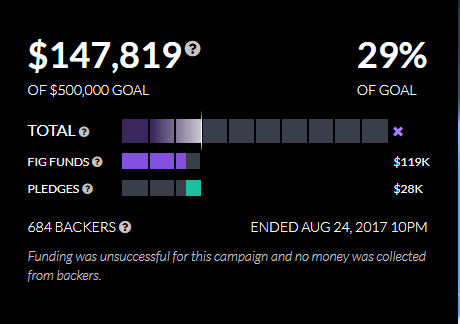Against "Accessibility"
Thanks to the work of advocates like AbleGamers there's been a strong uptick in the game industry's understanding of accessibility issues. But "accessibility" as a term is much broader than, and predates, the focus on disability and literal access. In this blog I'll argue for a narrow conception of "accessibility" while examining (and largely rejecting) previous uses of the term.
What Do We Mean By "Accessibility"?
I often hear that one thing holding back both game design and criticism is a lack of proper terminology. This is an excuse that makes less sense with each passing year and it's a flimsy excuse to begin with; it's hard to believe that new jargony terms are what's needed when we're so bad at using existing ones.
I can't count the number of times I've seen a new walking sim described as "unique" despite using not only familiar mechanics (walk around, examine objects, read graffiti, listen to audio logs) but a familiar central story as well: explore the abandoned place and figure out where the people went. Or how often "core gameplay loop" is used to describe something that is neither gameplay nor a loop. "Everything is political" is a common statement these days, but if everything is political then the word necessarily has no meaning. (Imagine trying to justify the claim that "everything is ham")
By my count the game industry regularly uses "accessibility" to refer to four or five distinct concepts, most of which are better described by other more specific words.
Actual accessibility
Immediate Understandability
Approachability
Difficulty
Conformance to Preference
Accessibility Meaning 1: Actual Accessibility

"There are many kinds of intelligence: practical, emotional. And then there's...actual intelligence, which is what I'm talking about.
What I'm calling "actual accessibility" is the one related to disability and access. This sort of accessibility is good. Making games more accommodating to people with disabilities is just a nice thing to do, and those changes are often helpful even to the non-disabled. Subtitles can help when people need to play with low volume, for people who aren't native speakers, or can rescue a game with sound mixing issues. (Such as in Xenoblade Chronicles X, where the music in cutscenes is regularly mixed too loud to hear the dialogue) A low health indicator that looks different not only in color but some other aspect is easier to pick out even for someone with no vision issues. It's up to each developer to determine the effort they put into accessibility but broadly speaking that effort is a good thing.
This use of "accessibility" — the plain English meaning — is fairly new in games. For a long time "accessibility" has primarily meant a mixture of lowering difficulty and "streamlining." If you find a developer interview from a decade ago about making their sequel more accessible it's almost certainly not about actual accessibility but instead about something like moving a game from PC to console and making it palatable to that audience.
Accessibility Meaning 2: Immediate Understandability
Disclaimer: when it comes to understandability, approachability, complexity, etc, there are accessibility issues related to cognitive functions. The following sections should be read as addressing "casualization," "streamlining" etc for the sake of mass appeal, while granting that those overlap with "actual accessibility." It's left to the reader to determine which sorts of streamlining changes are in service of genuine accessibility concerns and which are not.
Frequently when people use "accessible" what they mean is "streamlined" or "simplified." Why don't they just say that then? You'd have to ask them, but I'll suggest one reason here that I'll revisit later: "accessible" conveys a certain moral weight and importance; it's a word with a very positive connotation, whereas a term like "simplified" reads as neutral or negative.
If you're a Deus Ex 2 developer you probably don't want to say that your game has smaller maps and universal ammo because you think console gamers have smaller brains than PC Gamers — that sounds bad! That the game is being "made more accessible" sounds good — who could possibly be against accessibility?
One downside of using "accessibility" as marketing-speak is that gamers are now trained to roll their eyes and think "here we go again" when developers talk about making a game more accessible. Not because those gamers are against actual accessibility changes but because they're against accessibility as a euphemism for sacrificing core elements of a franchise in an attempt to broaden market penetration.
Is Immediate Understandability Good?
Not only am I opposed to using "accessibility" to mean "understandability" but I'm also opposed to the conventional wisdom on understandability. This may seem bonkers at first blush but I'm not convinced that immediate understandability is necessarily a good thing. (At least not across the board)
It pays to be a bit wary of conventional wisdom, especially when delivered in slogan form separate from any original justifying arguments. There are two related conventional wisdoms I'd like to examine: "easy to learn, hard to master" and the idea that while depth is good complexity is bad.
But lately I find myself questioning design as a way of understanding where games come from and what makes them work. There are so many great games in the world that don’t reflect good design principles...
...
Or take League of Legends. This game breaks so many rules of “good design”. It is a clone. It is over-complicated to the point of utter indecipherability. It is fussy, baroque, full of arbitrary, non-intuitive details (Last hitting? Inhibitors??). It makes no attempt to teach the player or draw them into its labyrinthian systems.
I certainly don't agree with everything in Against Design by Frank Lantz but the above point seems unassailable. (Well...minus the "clone" claim) And what's written above could just as easily apply to the entire MOBA genre or to any number of Steam survival games.
Just as there are people who like it when potential romantic partners play hard-to-get or are drawn to tall dark mysterious strangers there are people who like a coy games that don't readily reveal their mysteries of content and construction.
I've often heard people use Street Fighter 2, one of the most popular games of all time, as an example of "easy to learn, hard to master." But Street Fighter 2 is not particularly easy to learn. Compared to contemporary arcade games it was much more complicated with virtually zero instruction. The game introduced concepts that, while well-understood today, were novel then: blocking by holding back, special move motions, charge motions, combinations based on hit stun, cross-up attacks, cancelable attacks. The game had six buttons at a time when most games had two.
Street Fighter 2 was not intuitive or streamlined. Is was the polar opposite of streamlined, not "accessible" at all in the marketing-speak sense. What Street Fighter 2 was, however, was fun for people at all levels. It had great graphics and animations, detailed backgrounds and cool line-scrolling parallax foregrounds. It had catchy music. Even if you didn't know what you were doing you could pick Chun-Li and mash out some "wind kicks", or mash fierce punch as Guile to alternate (for a beginner seemingly at random) between a sweet backfist, a devastating uppercut and a suplex, each with excellent examples of what today we'd call "game feel". It's not that Street Fighter 2 is easy to learn, it's that it's fun even when you haven't learned it. And many people never learn it, content to wiggle the joystick and mash buttons forever.
Similar to "easy to learn, hard to master" is the notion that depth is good but complexity bad. This is a meme-level proposition typically supported with meme-level arguments, usually involving Chess. (The world needs another appeal to Chess like I need a hole in my head) There's a simple "proof of the pudding is in the tasting" counter-argument to the idea that complexity is bad: despite whatever rock-solid on-paper reasoning you claim to have plenty of people like it.
League of Legends is extremely complex. Not only are there many rules but as in a collectible card game the distinction between rules and content is thin. To play the game at a reasonable level you have to understand dozens of characters and hundreds of moves, and to play at a high level you have to understand that for over a hundred characters. There are also items to consider, jungle enemies and XP formulas, ability interactions that follow no intuitive logic and can only be learned through experimentation.
There's a notion that if a game is popular an "accessible" version of that game will be even more popular. But the streamlined version of League of Legends, Heroes of the Storm, is less popular. Maybe the right level of complexity for MOBAs is very high because the breadth is a main reason people like that style of game. When Street Fighter 2 came out 8 selectable characters seemed like a lot. Now people complain if there aren't at least 20. They demand breadth.
Every so often someone attempts to make a more "accessible" fighting game. Fantasy Strike didn't come close to reaching its goal on Fig and appears to be one of the worst-performing games on the platform. Rising Thunder was canceled while still in alpha. There doesn't appear to be high demand for streamlined fighting games, at least the non-transformative kind that takes the well-established Capcom formula and subtracts complexity. (As opposed to a more transformative, more apples-to-oranges game like Nidhogg)

This was the final result of the Fig campaign for Fantasy Strike. The vast majority of the funding was from internal "fig funds." Demand for the game just doesn't appear strong.
The belief that a streamlined game will have more mass appeal is for many a non-falsifiable religious one. Whenever a streamlined game does well it's evidence that the theory is sound, but whenever one does poorly it's dismissed as an irrelevant data point. But for every Monster Hunter: World there's a Marvel vs Capcom: Infinite; the track record of games that h





































